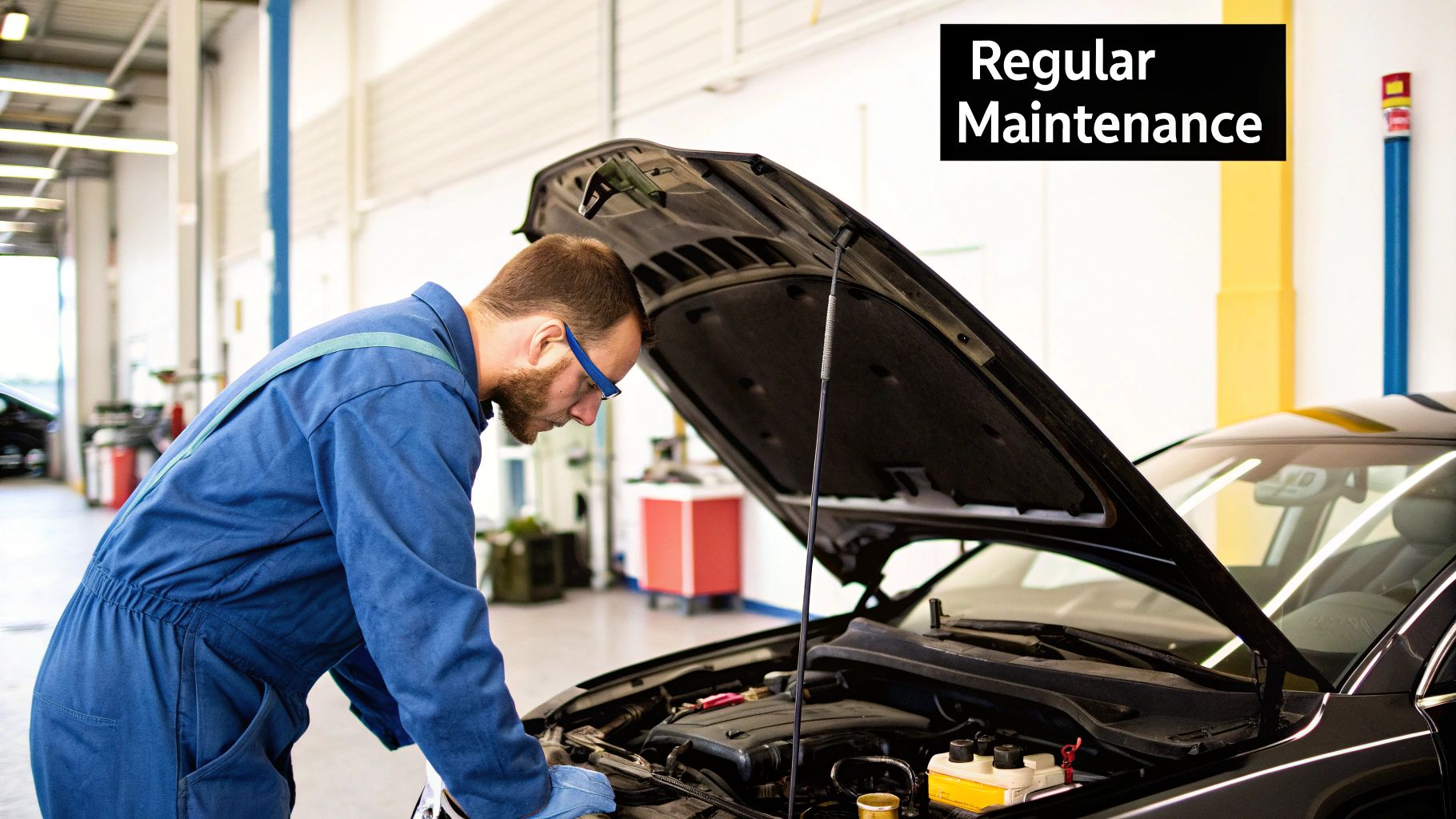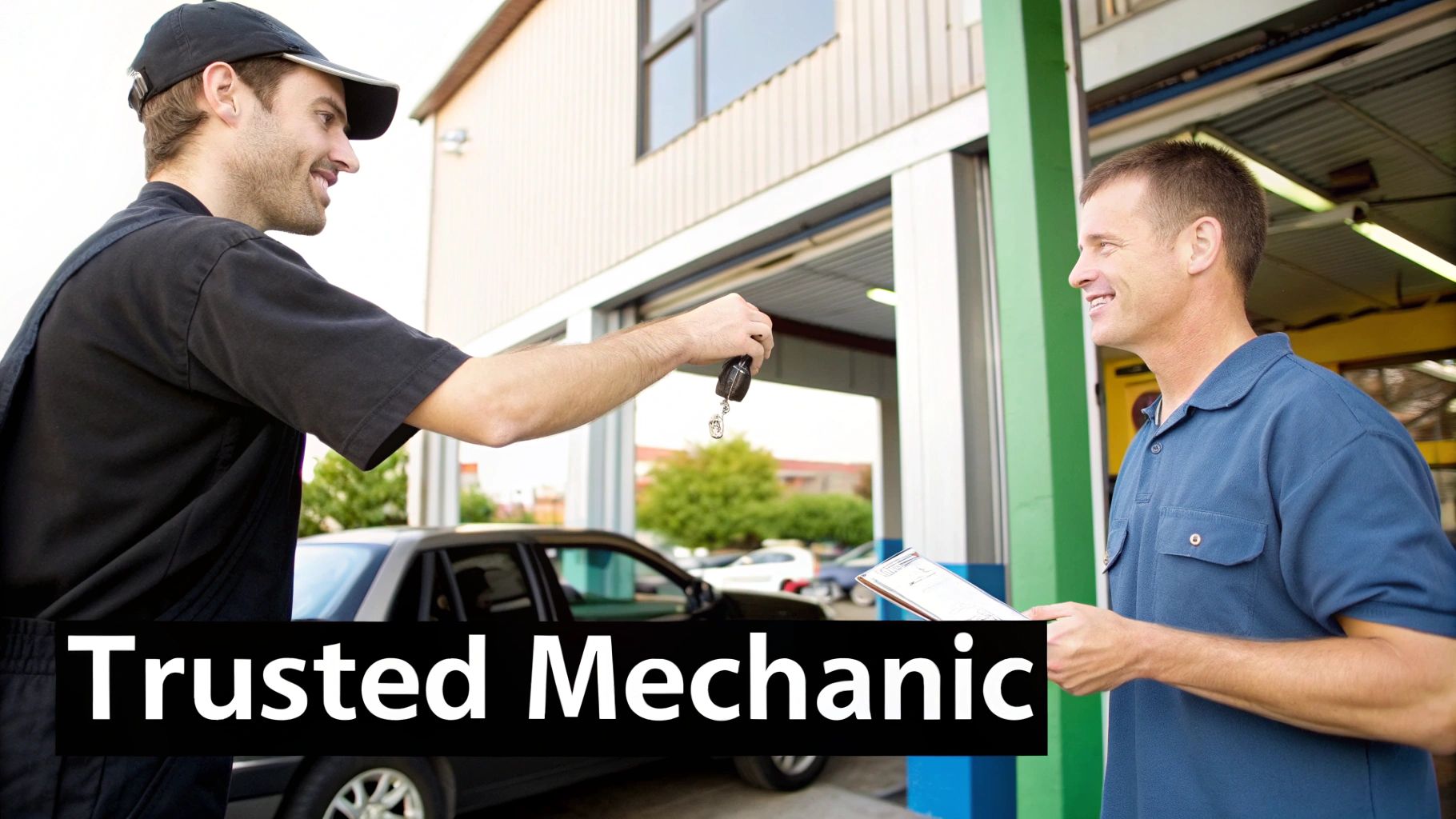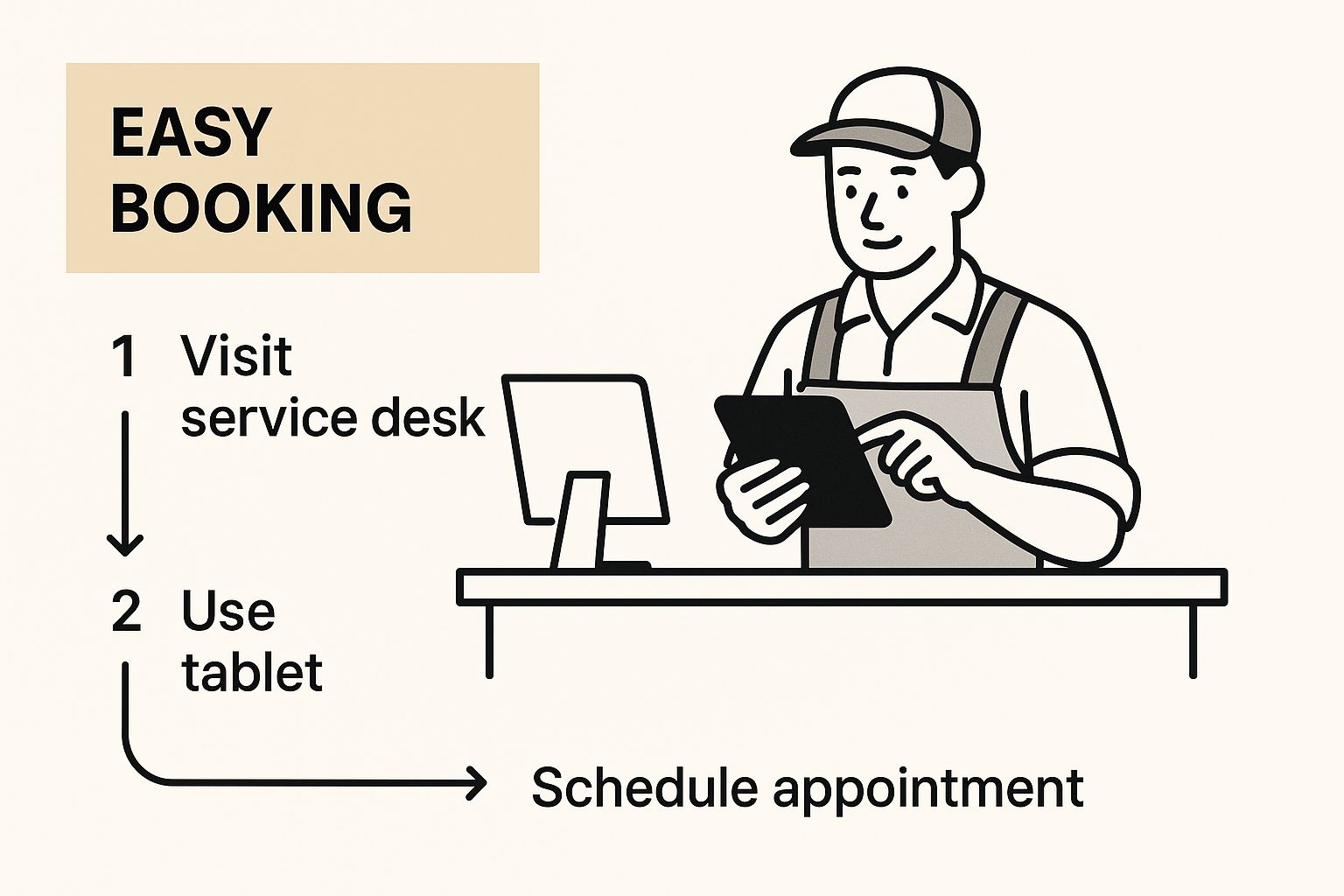How to Find a Local Car Mechanic Near Me You Can Trust
- coledem
- Sep 8, 2025
- 9 min read
Trying to find a good local car mechanic near me can feel like a gamble. It all comes down to finding a workshop that gives you trustworthy advice and carries out quality repairs. A great mechanic delivers peace of mind, not just a temporary patch-up.
Why a Great Local Mechanic Is Your Car's Best Friend

Think of your car. It's an intricate machine, and building a relationship with a skilled technician is one of the smartest things you can do for it. They're not just there to fix things when they break; they're looking out for your vehicle's long-term health. That proactive approach catches small issues before they snowball into massive, wallet-emptying disasters.
With cars getting more and more complex, having a seasoned expert you can actually talk to is a massive advantage.
The Value of Personal Service
Here’s where local garages really shine, especially compared to the big, faceless dealerships. You build a real connection. Your mechanic gets to know you, your driving habits, and the specific history of your car. This isn't just nice; it leads to faster, more accurate diagnostics and maintenance advice that actually fits your needs.
It really makes a difference:
Personalised Attention: You’re not talking to a service desk; you’re often speaking directly to the person with the spanners in their hand.
Consistent Care: Having the same person work on your car over the years means they know its little quirks and what’s been done before.
Community Trust: Local garages live and die by their reputation. Their name is everything, which pushes them to deliver honest work and clear communication.
A dependable local mechanic doesn't just see a registration number on a job sheet; they see a neighbour. That relationship is built on trust, with the shared goal of keeping your car safe and reliable.
This personal touch is a huge reason why people stick with their local garage. If you want to look a bit deeper, check out the top benefits of local garages for everyday drivers and see why so many people are making the switch.
Kicking Off Your Search for the Right Local Mechanic

Before you even think about firing up Google, start with the most reliable source there is: people you trust. Chat with your neighbours, colleagues, or friends in the area. Nothing beats a genuine recommendation from someone who’s been there and had a good experience.
A quick post in a local community Facebook group can be a goldmine. You'll often get honest, unfiltered opinions about garages that have built a solid reputation in the community over years of good work.
How to Actually Use Online Reviews
Once you have a few names, it’s time to head online. Platforms like Google Maps and Trustpilot are brilliant resources, but you need to read between the lines. Don’t just get swayed by the overall star rating; look at the actual comments.
Look for recurring themes. Are people constantly praising the garage for its honest pricing and clear communication? Do they mention a particular mechanic by name? A mix of glowing reviews and a few slightly less-than-perfect ones can be a good sign—it often points to a more authentic profile.
Spotting real feedback is all about the details. A review saying, "They finally sorted the weird rattling noise in my Focus and showed me the worn-out part," tells you a lot more than a generic "Great service!"
With a handful of promising garages on your list, it's time to get organised. Taking a structured approach now will save you a headache later. If you're looking for more local tips, our guide to finding a trusted car garage in Bedford has some extra pointers.
A simple comparison table is perfect for keeping track of your options and seeing how they stack up against each other.
Mechanic Shortlist Comparison
Mechanic Name | Location / Proximity | Online Rating (Avg) | Source of Recommendation | Specializes in Your Car Brand? |
|---|---|---|---|---|
By filling this out as you go, you’ll have a clear, at-a-glance view of your top contenders, making the next step of your decision much easier.
How to Properly Vet Your Shortlisted Mechanics
So, you've got your shortlist. Now the real work begins. This is where you move from a broad search to a detailed investigation, digging into each potential mechanic to find the genuine experts. It's all about looking for the tells—the signs of quality and professionalism—before you hand over your keys.
A brilliant first check is to look for professional accreditations. Are they affiliated with respected bodies like the Institute of the Motor Industry (IMI)? These aren't just fancy logos for their website; they signify a real commitment to staying up-to-date with industry standards and ongoing training. In the fast-moving world of automotive tech, that's a massive plus.
Making That First Contact
That first phone call or drop-in is your chance to get a feel for the place. Think of it as a mini-interview. How they handle your questions tells you a lot about their customer service. A workshop that’s patient, answers clearly, and doesn’t rush you off the phone is usually a good sign.
Have a few key questions ready to go:
"What's your experience with my car's make and model?" Some garages specialise, and their deep knowledge of your specific vehicle can be a huge time and money saver.
"What kind of warranty do you offer on your work?" Any mechanic worth their salt will stand by their repairs. A 12-month guarantee on both parts and labour is a solid industry benchmark.
"How do you handle quotes and getting approval for work?" You need a garage that provides a clear, itemised estimate and promises never to do extra work without your explicit say-so.
Modern garages are making this whole process far easier for the customer right from the start.

This focus on easy booking and transparent communication shows how the best workshops are putting the customer experience first.
Trust Your Gut: Take a Look Around
Never underestimate the value of popping by for a quick look. The state of the workshop can be incredibly revealing. You're not expecting a surgical theatre, but a reasonably tidy and organised space suggests a professional, meticulous approach to their work. If the place looks chaotic, their repair process might be, too.
Let's not forget, this is a major part of the UK economy. The Motor Vehicle Maintenance & Repair sector is valued at around £34.9 billion, and you can discover more about the UK's mechanic industry to see just how big these businesses are.
A tidy workshop with modern-looking equipment and technicians who seem organised often translates into a more professional and reliable service. It's a small detail that can tell you a lot about their work ethic and attention to detail.
Getting to Grips with Repair Quotes and Costs
When a repair quote lands in your hands, it can feel like deciphering a secret code. If you want to find a truly fair local mechanic, you need to know what you’re looking at. A proper quote isn't just a single figure; it’s a transparent breakdown of exactly where your money is going.
Any decent estimate should clearly itemise three things: parts, labour, and VAT. This level of detail is non-negotiable for making a smart decision. If a garage doesn’t offer an itemised quote from the get-go, don't hesitate to ask for one. It's your right as a customer.
How to Compare Quotes Like a Pro
Once you have a couple of quotes, it's tempting to jump straight to the bottom line and pick the cheapest. Don't. The real story is always in the details.
First, look at the parts they plan to use. Are they OEM (Original Equipment Manufacturer) parts—the same ones your car came with from the factory—or are they cheaper aftermarket alternatives? A good garage will explain the pros and cons of each and give you the choice.
Then there’s the warranty. Any workshop worth its salt will stand by its work. You should be looking for a solid guarantee that covers both the new parts and the labour to fit them.
If the repair is the result of an accident, knowing how to file a car insurance claim is a massive help in managing the financial side of things.
A cheap quote might look great at first, but if it means poor-quality parts and no warranty, it'll likely cost you more down the road. The best value comes from a fair price for reliable parts and workmanship you can trust.
Labour costs are the other big piece of the puzzle. Finding skilled technicians isn't easy, and that affects what garages need to charge. As of April 2025, the average advertised salary for a vehicle technician hit £40,128. That’s a 13% jump in just two years, all thanks to the high demand for their skills. You can read the full research on the automotive labour market to see the data for yourself.
Understanding this helps you appreciate what you're paying for in the labour rates. It's not just time; it's years of training and hands-on experience. If you’re curious about routine maintenance costs, our guide on what a UK car service includes breaks it all down.
Building a Lasting Relationship with Your Mechanic
Finding a good local mechanic is one thing, but the real gold is in building a lasting relationship. When you do, they stop being just a service provider and become a trusted advisor for your vehicle’s health. It all starts with good communication.
When something feels off with your car, try to be as specific as you can. Saying "it's making a funny noise" is a bit vague. Instead, try something like, "There's a high-pitched squeal coming from the front right wheel, but only when I brake at low speeds." That kind of detail gives a technician a massive head start in diagnosing the problem.
Becoming a Valued Customer
It's a two-way street. Being a good customer often gets you better service. Respecting their time and expertise goes a long way. Remember, figuring out a tricky issue isn't always instant; it’s a methodical process of elimination that takes real skill. That mutual respect is what solid relationships are built on.
Once that trust is there, your mechanic can be more proactive. They’ll get to know your car's history, its quirks, and can suggest preventative work that will genuinely save you money down the line. We look deeper into this in our guide on why regular car service matters.
A trusted mechanic who knows your vehicle inside and out is one of the best assets a car owner can have. They can spot developing issues early, offer tailored advice, and keep your car safer and more reliable for years to come.
This relationship is becoming more crucial as the car market evolves. While traditional petrol vehicles still make up 52.2% of the market, battery electric vehicles (BEVs) have shot up to nearly 19.6%. This shift means technicians need a much broader skill set than ever before. You can discover more insights about these UK automotive market trends and see why having a mechanic with versatile expertise is so important today.
Still Have Questions? Let’s Clear Things Up
Even once you've found a promising local garage, a few questions might still be rattling around in your head. It’s completely normal. Let’s tackle some of the most common things drivers ask when they're searching for a "local car mechanic near me".
How Do I Know if a Quote Is Fair?
Got a quote that feels a bit steep? The single best thing you can do for any non-emergency repair is to get a second, or even a third, opinion. It’s your right as a customer.
Always ask for an itemised quote that breaks down the parts, the labour, and the VAT. This transparency is a hallmark of a good garage. You can then do a quick online search for the parts yourself to get a ballpark figure. Labour rates vary, of course, but having a couple of quotes in hand gives you a realistic idea of the going rate in your area.
Dealership vs. an Independent Garage – What’s the Right Call?
This is a classic dilemma, and the answer often hinges on your car's age and your wallet. Main dealers have brand-specific training and use official parts, which is often required if your car is still under its manufacturer's warranty. You don't want to accidentally void it.
Independent garages are usually friendlier on the budget and you often get to speak directly with the person who will be working on your car. If your car is out of warranty, a reputable independent that knows your make and model is almost always a brilliant, cost-effective choice.
A key difference between types of replacement parts is their origin. Understanding this helps you make informed choices about your repairs and what you are paying for.
What’s the Deal with Different Types of Car Parts?
You’ll hear mechanics throw around a few terms for parts, and it can be confusing. Here’s a simple guide to what they mean:
OEM (Original Equipment Manufacturer): These are identical to the parts your car was built with, made by the same company.
OES (Original Equipment Supplier): These are from a company that supplies parts directly to the car manufacturer. They’re often the same quality as OEM, just without the car brand’s logo.
Aftermarket: These are made by other companies. Quality and price can vary wildly, from top-tier to budget options.
A mechanic you can trust will be upfront about the parts they plan to use, explaining why they recommend a particular type and what the trade-offs are.
For honest advice and expert car care in Bedfordshire, you can always count on the team at Krause Autos. From MOTs to tricky diagnostics, we provide quality service that speaks for itself. Visit our website to book your next service or repair.





If you’re looking for a reliable local mechanic, I definitely recommend checking out Torrance Automotive. They’ve built a strong reputation for honest work and great customer service. I’ve used them personally for suspension repairs, and they really know their stuff when it comes to car suspension near me and other general auto services.
They’re local, transparent about pricing, and take the time to explain what’s going on with your vehicle which makes a huge difference when finding a mechanic you can actually trust.